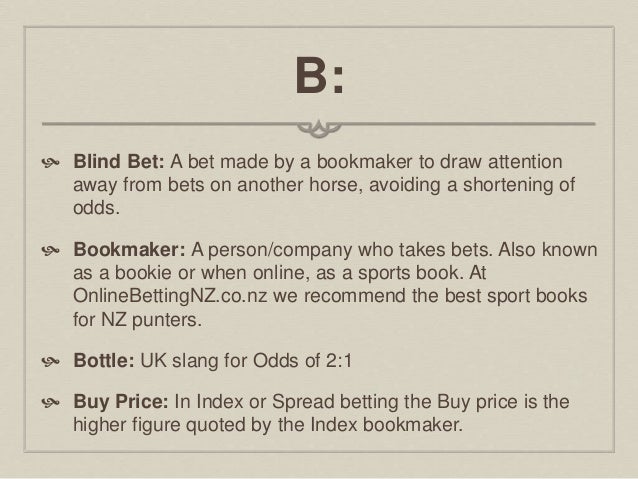- Ticket: This is another term for a sports betting wager. When you bet in a brick-and-mortar location, they print you out a “ticket,” which is a slip of paper with your betting information on it. This is what you turn in to collect your winnings. Online, tickets are digital.
- Betting limits are the largest wagers sportsbooks will take from its clientele. The limits will differ based on the sports book, sport, event start time and other factors. Often sports books will set lower betting limits when the line is initially released.
Here is a list of common sports betting terms that can help you understand the industry better, be a better sports bettor, and just generally feel more comfortable when discussing the subject.
Here is a list of common sports betting terms that can help you understand the industry better, be a better sports bettor, and just generally feel more comfortable when discussing the subject. Sports betting is growing by the day, especially in the United States where it’s becoming legal in more and more states.
Sports betting is growing by the day, especially in the United States where it’s becoming legal in more and more states. As the industry continues to grow, so does its popularity, but no one wants to be left feeling like they’re on the outside, right? Review these sports betting terms so you know what you’re talking about and can understand industry jargon.
- Use Promo Code: SHARPSIDE
- Available In 31 States!
- Fun, Fast Prop Picks
Action: A wager or bet of any kind.
Against the Spread (ATS): Taking action on one side of a point spread, but either taking points or laying points.
Backdoor Cover: When a side of a bet scores points late in a competition to cover the point spread.
Bad Beat: When you lose a wager you believe you should have won, you often refer to it as a “bad beat.” Oftentimes, a bad beat occurs when your side was expected to win the contest but ultimately lost.
Bankroll: The funds you have available to wager with.
Betting Line (or Line): The betting odds or point spread.
Bookmaker: A creator of betting lines and odds, often at a sportsbook.
Bookie: A person who accepts wagers.
Book: As a noun, “book” is short for “sportsbook – an establishment that accepts wagers. As a verb, to book means to place or accept a wager.
Buying Points: When a sports bettor pays an additional price to alter the betting line and adjust the odds, it is called “buying points.”
Chalk: Another term for the favorite or side of a bet that the public is favoring.
Circle Game: A game or competition with restricted (lower) betting limits.
Closing Line (or Close): The final point spread or betting line before a game or competition begins.
Consensus: The volume of bets that the public is on for a side of a game or competition, often listed as a percentage.
Contrarian: Going against the grain of public sentiment, a pick made that is opposite of the majority opinion.
Cover: Beating the point spread. When a side beats the point spread, it has “covered” the bet.

Dime: Slang for a one-thousand dollar ($1,000) wager.
Dog: Short for “underdog,” it is the side of a bet that is not favored.
Edge: An advantage.
Even Money: When the odds of a bet are the same as the wager, 1-to-1, and there is no vigorish (vig).
Gambling Terms
Exotic: A wager other than a straight bet or parlay, often called a “proposition bet” or “prop.”
Favorite: The side of a bet that is the likely winning side.
Futures Bet (or Future): A wager on a future sporting event. Most commonly, it is a bet placed on the outcome of an event in the current or upcoming season, such as placing a wager before the season or early on in the season for which team will win the Super Bowl in the NFL.
Grand Salami: An over/under total on the combined NHL goals for an entire day of games.
Handicapper: A person who tries to predict the odds and outcomes of an event.
Handle: The amount of money taken by a sportsbook or sports betting operator. Handle can be broken down per event, series of events, a specific time period, or in total.
Hedge: To place a bet opposing a wager you already have in place so that you are lowering your exposure or risk.
Hook: In point-spread betting, the hook is the extra half point attached to the spread, very commonly seen in football betting.
In-Play Betting: Another term for live betting, in-play betting is wagering that takes place while a game or event is running. Due to the fluid nature of the game or event, in-play betting lines adjust on the fly.
Juice: Another term for the “vig” or “rake,” which is the money a sportsbook or sports betting operator takes on a wager.
Key Number: A common point differential when it comes to scoring margins. Key numbers are most commonly referenced in football betting in regards to multiples of three or seven.
Laying Points: When a bettor is giving points to the other side. Betting the favorite.
Limit: The most amount of money a sportsbook or sports betting operator will take as a wager on an event.
Lock: A term used to describe when a bettor views a pick as a guaranteed victory.
Long shot: A big underdog to win.
Middle: An outcome that falls between two bets on different sides of the same event, allowing the bettor to win both wagers.
Money line or moneyline: The odds or price of betting an event straight up, without the use of a point spread. When betting the money line (or moneyline), the favorite will be designated with a minus sign next to the number. The higher the number, the greater the odds the favorite has to win, but the lower the payout. The underdog will be designated with a plus sign next to the number. The higher the number, the lower the odds the underdog has to pull off an upset, but the larger the payout will be should the upset occur.
Nickel: A $500 bet.
Oddsmaker: The person or persons who set the odds on an event.
Off the Board: When a sportsbook or sports betting operating removes a wager from its offering and is no longer taking bets on the event. Oftentimes, an operator will take a bet off the book when deciding to change the odds. Leaving the bet up could expose the oddsmaker to increased risk.
Opening Line (or Open): The initial point spread or betting line on a game or competition.
Over/Under: The line set on a specific total that bettors can pick to go over or under. Over/under lines are most commonly made on the point totals of games, but can also be used on teams, players, and other prop bets.
Parlay: A wager that includes multiple bets within one greater bet. To win, a bettor must hit all the individual bets.

Pick’em: When a game or event has no side that is favored over the other.
Point Spread: The point spread is how teams or sides are handicapped against one another. It’s the number of points one side is giving or receiving to the other. For more on point spread betting, click here.
Sports Betting Terminology
Prop Bet (or Proposition Bet): A prop bet, short for proposition bet, is a type of side bet that is placed on something not determined by the final outcome of a game, such as a specific statistic for a given player.
Public: Another term for volume of bets being placed.
Puck Line: Hockey’s version of the point spread, although rarely anything different than -1.5 or +1.5. Instead of altering the points given, bookmakers will adjust the odds on these lines.
Push: A tie.
Quarter: A $25 bet.
Return On Investment: A measurement on a wager’s or bettor’s performance giving in the ratio of net profit and cost of investment.
Reverse Line Movement: When a line moves opposite of the betting percentages, or opposite the public.
Round Robin: A wager that allows a bettor to place multiple parlay wagers within a single bet.
Run Line: Baseball’s version of the point spread.
Runner: A person who places a wager for another person.
Sharp: A professional sports bettor or a bettor deemed to have an enhanced advantage.
Square: A casual, hobby sports bettor. Not a professional and considered to be just a member of the general public.
Sportsbook: An establishment that accepts wagers.
Steam: Term used to describe a fast-moving line.
Straight Bet: A bet that is made without using a point spread. In other words, another way to classify a money line bet.
Take the Points: The opposite of laying the points, taking the points means a bettor is receiving points from the other side. Betting the underdog.
Teaser: A bet that allows the bettor to adjust the point spread by adding or subtracting points. The adjustment comes at a cost, though, as the bettor will be faced with a lower return determined by the amount of the adjustment.
Total: The combined number of points, runs, or goals from an event.
Tout: A person who sells his or her picks and sports betting knowledge to others.
Underdog: The side of a wager that is the unlikely winning side.
Unit: The amount a bettor deems to be one wager’s worth. Bettors often bet in terms of units, with the number of units bet on an event determined by the bettor’s confidence in the wager.

Vigorish (or Vig): Another term for the “juice” or “rake,” which is the money a sportsbook or sports betting operator takes on a wager.
Wager: A bet.
Wise Guy: Another term for a sharp bettor used to describe a professional bettor or someone deemed to have an enhanced advantage.
Sports Betting Terms Explained

Sports Handicapping Stats
That’s it for now. Bookmark this page or check page often, as we’ll continue to add more sports betting terms to this list.